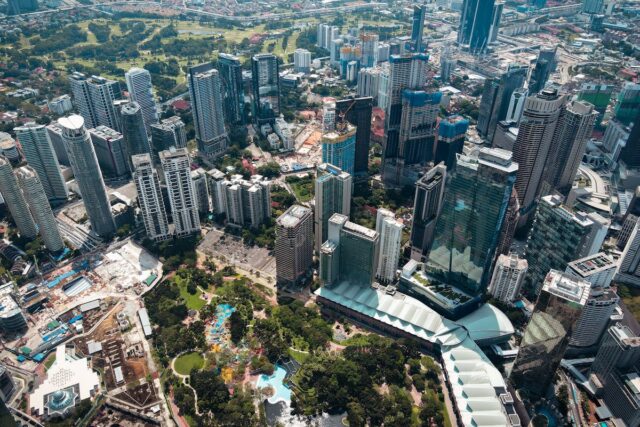Business parks are specialized areas designed to house commercial businesses, corporate offices, and sometimes industrial facilities. These spaces are strategically planned to create a thriving business ecosystem, offering amenities, infrastructure, and accessibility to cater to companies of all sizes. They are more than just office locations; they’re engines for economic growth.
Modern business parks are attractive to startups, established companies, and even remote teams seeking flexible office arrangements. Their structured environment supports collaboration and innovation, making them a preferred choice for many.
Understanding the Purpose
A Hub for Commercial Growth
Business parks are designed to promote economic development and create jobs. Companies within these parks enjoy better infrastructure, reduced operational challenges, and access to resources that enhance productivity. With well-maintained roads, parking spaces, and utilities, these hubs are tailored for seamless business operations.
Key Features of Modern Business Parks
Today’s it offers more than office spaces. Many include green landscapes, recreational areas, and dining facilities. They’re built to accommodate smart office spaces equipped with advanced technology and energy-efficient systems. These features make them attractive to businesses focusing on sustainability and employee well-being.
Types of Business Parks
Commercial vs. Industrial Business Parks
- Commercial: These focus on office spaces for corporate entities. They provide coworking zones, meeting rooms, and IT services.
- Industrial: These cater to manufacturing and warehousing needs, offering large spaces and access to transportation hubs.
| Type | Primary Use | Key Features |
| Commercial Parks | Corporate offices | Meeting rooms, coworking spaces |
| Industrial Parks | Warehousing, manufacturing | Transportation access, large areas |
| Mixed-Use Developments | Blend of office and retail | Green spaces, urban amenities |
Mixed-Use Developments
Mixed-use developments combine office spaces with retail shops, dining options, and even residential areas. They create a holistic environment where employees can work, relax, and live without extensive commuting.
Benefits of Leasing in a Business Park
Access to Corporate Office Spaces
Leasing in a business park gives companies access to state-of-the-art corporate environments. These parks often feature modern offices tailored for both small teams and large corporations.
Networking Opportunities in Business Ecosystems
One of the greatest advantages of business hubs is the opportunity to connect with other companies. Proximity to like-minded businesses fosters partnerships and innovation. These parks are designed to encourage collaboration through shared amenities.
Proximity to Business-Friendly Locations
Strategically located near highways, airports, and urban centers, it offers unmatched accessibility. This makes them ideal for client visits and employee commutes, reducing travel times and boosting efficiency.
Top Factors to Consider When Choosing a Business Park
Location and Accessibility
A key factor when selecting a business park is its location. Businesses should prioritize near business-friendly locations with easy access to transportation and urban amenities.
Amenities and Smart Office Spaces
Amenities like high-speed internet, conference rooms, and recreational facilities can make a significant difference. Look for parks offering smart office spaces with energy-efficient designs and modern layouts.
Green and Sustainable Features
Sustainability is a growing concern for companies. Many business parks now include green landscapes and use renewable energy. These features not only lower operational costs but also enhance the brand image of businesses located there.
Trends Shaping the Future of Business Parks
Rise of Smart and Green Business Parks
The future of it lies in their ability to adapt. Smart parks equipped with IoT devices, automated systems, and renewable energy sources are becoming popular. These parks prioritize sustainability while integrating advanced technologies.
Integration of Co-Working Spaces
Traditional office setups are being replaced with co-working spaces. These areas foster collaboration and allow companies to scale up or down as needed. Such flexibility attracts startups and small businesses.
Adapting to Office Space Trends
The shift to hybrid work models has influenced the design of it. Developers are now incorporating open spaces, wellness centers, and dynamic layouts to cater to modern employees’ needs.
Examples of Successful Business Parks
Notable Business Parks in [Your Location]
Highlighting specific examples like Silicon Valley or Canary Wharf can showcase the global appeal of it. These areas combine innovation, infrastructure, and prime locations to attract leading companies.
How These Parks Attract Top Businesses
Top-performing business parks offer incentives like tax benefits, access to skilled talent, and advanced facilities. Their ability to support various industries is a significant draw for businesses looking to scale.
FAQs:
What Industries Benefit the Most From Business Parks?
Industries like technology, finance, manufacturing, and logistics thrive in it. Their tailored facilities meet the specific needs of these sectors.
Are Business Parks Suitable for Small Businesses?
Yes, many business parks offer affordable leasing options for small businesses and startups. Shared facilities and co-working spaces make them cost-effective.
What Amenities Do Business Parks Typically Provide?
Business parks often include parking, high-speed internet, conference rooms, dining facilities, and green areas to support employees’ productivity and well-being.






















